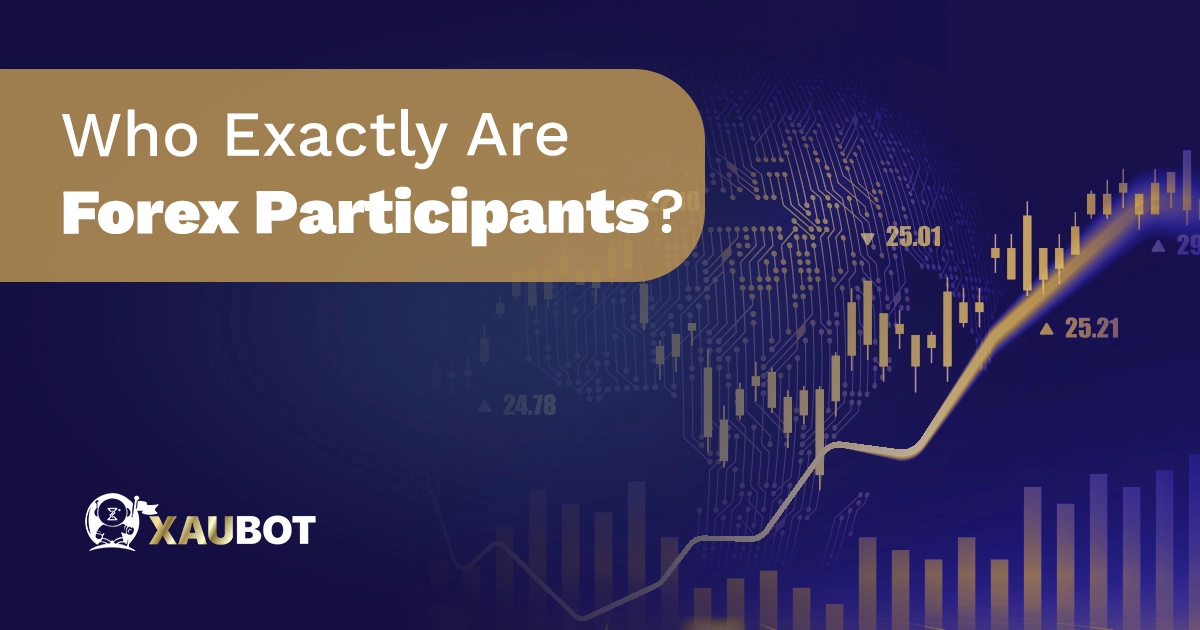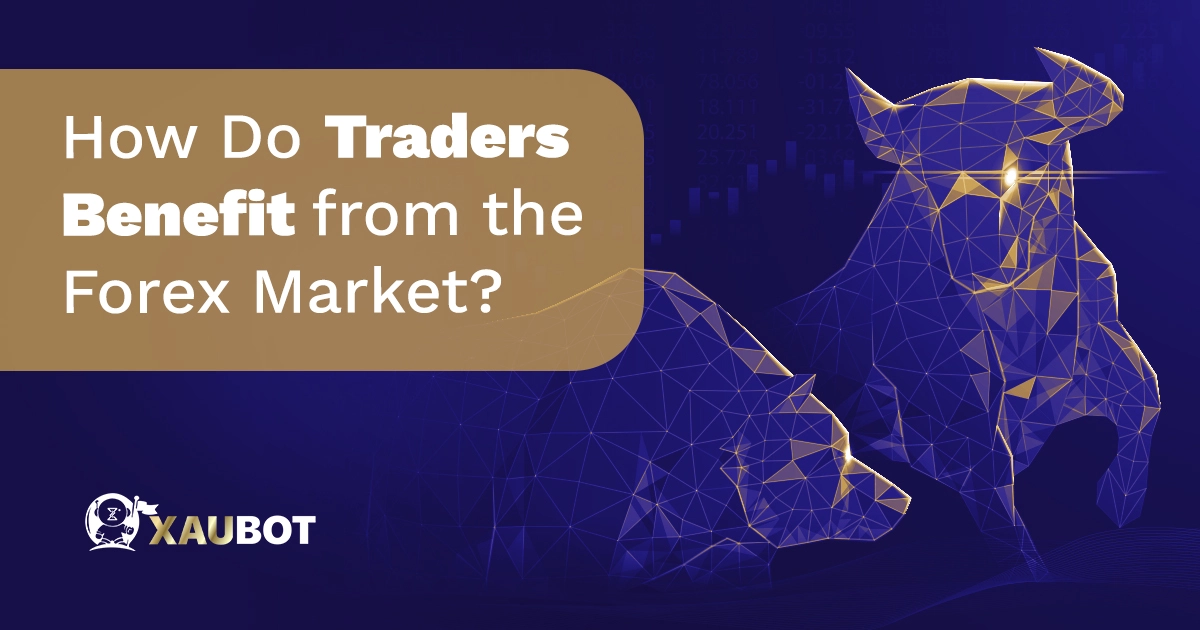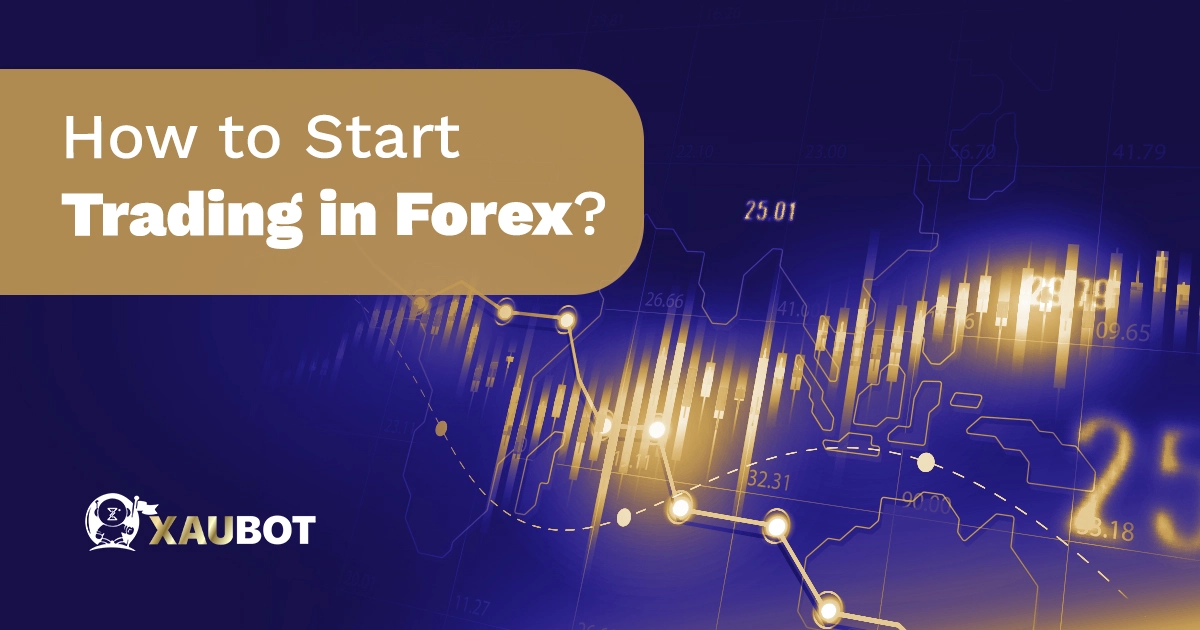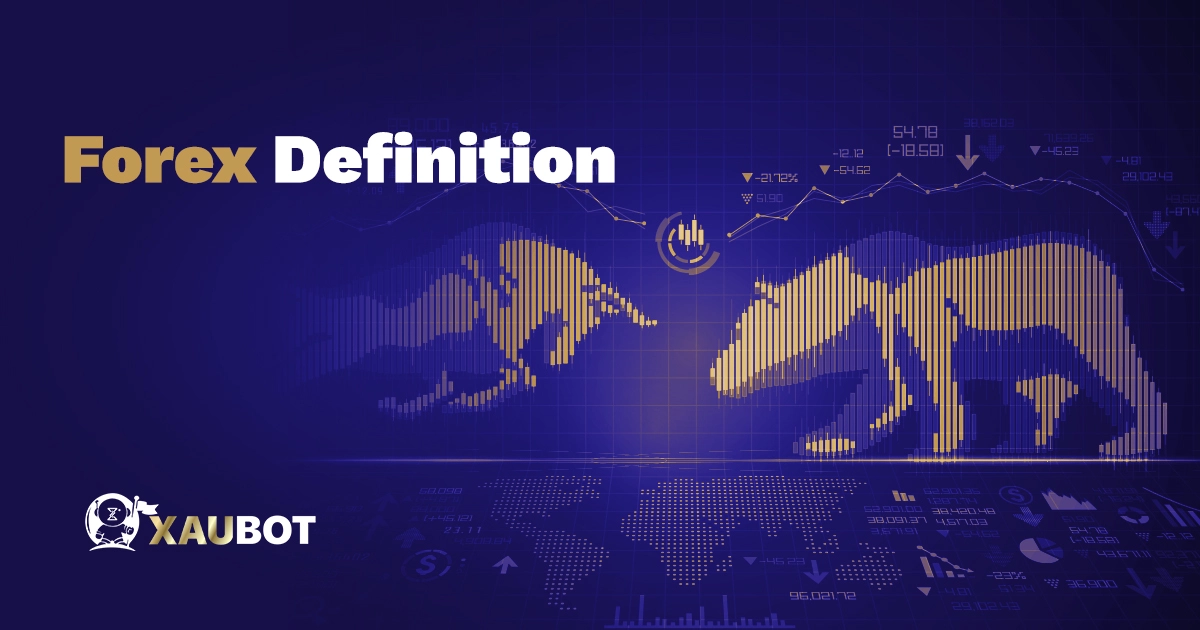And no wonder forex has gained a lot of popularity in the social media sphere. According to the data obtained from the Bank of International Settlements, the daily volume of trades in the forex has gone beyond $8 billion as of 2023.
So if you don’t know anything about the forex market or just want to make sure there are no gaps in your knowledge, we want to dive deep and analyze forex to see what forex is, how forex works, and all the other major details about this financial market.
What Is Forex?
Forex owes its name to the activity that actually takes place in its markets – i.e. foreign exchange. The forex market is quite literally the exchange of foreign currencies. There are of course many features that are characteristics of forex. But maybe one of the most prominent features is that the forex market is completely decentralized; meaning that there is no central authority figure, entity, or organization in charge of overseeing this market.
In fact, the way forex works through this decentralized manner is that the exchange of foreign currencies takes place online in a manner that is known as OTC or over the counter.
In fact, wherever you hear the term OTC, whether the stock market or even the crypto market, it means that the financial transaction is taking place outside of the conventional and regulated venue.
Precisely because Forex trades and transactions take place OTC and in a decentralized manner has allowed this market to be one of the longest running markets in the world in terms of sheer active hours. In fact, the forex market is active all the 5 weekdays from Monday to Friday essentially 24 hours a day.
Forex markets are of course virtual. But depending on the timing of trading, they can occur and coincide with the timing of different cities. This is how we have various forex sessions – or essentially markets – around the world.
Some forex sessions are more significant than others, merely due to the higher volume of trades that take place during those hours. Therefore, we have forex sessions that are much more well-known and highly important; including Tokyo (Japan), Hong Kong, Sydney (Australia), Zurich (Germany), London (UK), and of course New York (US).
Naturally, these forex sessions do not all coincide with each other. They are active during the conventionally popular working hours of the day, with a certain degree of variation of course. And this is exactly how forex never sleeps. When one session ends, another begins. And so on.
Though there are some overlaps between some sessions. Overlaps which are actually crucially important, and can last anywhere between 1 to 4 hours. These overlaps create the best opportunities for trading because of the extremely high volume of trades.
This was basically forex in a nutshell. But there is still a ton of more information to cover. Such as the precise working mechanisms of forex, traders, market participants, how forex trading works, and how you can start trading in forex yourself.
The Working Mechanisms of Forex
The truly good thing about the forex market is that unlike certain financial markets, you can start trading in it with absolutely nominal amounts of money. This is because unlike the past, where there used to be intermediary organizations overseeing the processes of the market, now the forex market is fully and wholly available to all users directly. And all traders and investors can begin their forex journey with however much money they want.
Of course another factor that contributes to this matter is that forex does not have a centralized building where some forex clerks would be sitting behind their desks answering your calls.
Forex is just the combination of all the virtual trading terminals from around the world.
And as such, there is absolutely no restriction as to who can participate in the market or even from where. You can trade foreign exchange in this market anywhere and almost any time.
Who Exactly Are Forex Participants?

Who Exactly Are Forex Participants?
It is true that certain types of market might be less accessible due to a myriad of restrictions and constraints. Such as geographical restrictions, whereby you wouldn’t be able to trade due to not having access to the market. Or technical constraints, whereby you wouldn’t be able to access the market due to not having the necessary market “savviness” so-to-speak.
However, this is another aspect where forex truly stands out from most other markets. Literally anybody can be a forex trader and participate in the market. All you need is basically an internet connection to access the market. In fact, almost as many people have access to the internet as they do to clean drinking water in the world. This rather shocking statistics shows just how many people have access to the internet.
All in all, with the ease of access and the abundance of opportunities, the following participants can be observed in forex:
- Central Banks
- Commercial Banks
- Hedge Funds
- Foreign Exchange Brokers
- An Assortment of Companies and Businesses
- Individuals Traders
Of course there are only some of the major participants in the forex market. Because the forex is the largest financial market in the world, the range of participants are just as large.
The Notion of Spot Trading in Forex
Generally speaking, there are different forms of trading in financial markets. For instance, one of the most popular forms of trading is known as futures or futures contracts. In trading futures, the buyer and seller agree upon the execution of a transaction at a specified time in the future at a specified price as well.
Sounds a bit complex, doesn’t it?
Well, luckily the major form of trading that makes up the forex market is known as spot trading.
In spot trading, foreign currencies are traded at the moment based on their current price.
Much simpler, right? We think so too.
Of course, the price of currencies is subject to a whole array of factors. Among the most important factors are the interest rates, the status of the economy, and other important and large scale factors in the world.
When a spot deal is being made in the forex market, the buyer will agree to purchase a certain amount of currency from a seller and provide a certain amount of another foreign currency in exchange. This is precisely how foreign currency exchange takes place.
When the trade is finalized and the trade position is closed, the traders can then set out to settle their trade or trades and withdraw their money. Of course, the currency in which they can withdraw depends upon the broker they had previously picked.
Now, if you are wondering how long it takes for a position to be closed and a transaction to be carried out completely, this too depends upon the broker you have opted for. Some brokers go through their customers’ orders much faster. But in general, it doesn’t take that long.
How Do Traders Benefit from the Forex Market?

How Do Traders Benefit from the Forex Market?
Though there are certain different ways through which traders can benefit from the market, the main way benefits are made is through speculation.
It is quite simple and elegant actually. What forex traders do is that they speculate on the changes that foreign currencies might assume. Naturally, if such speculations turn out to be correct, you can benefit from your trade. And in case the speculation is not as accurate as it should be, it will result in a loss.
Now, in order to make accurate and precise speculations, there are many factors to take into consideration and numerous tools to implement and take advantage of.
Because the number of factors to take into account when analyzing the market and even a single trading pair is so high, traders will almost always rely on different tools and techniques for analysis.
But before we show you exactly how you can become a forex trader, we need to clear out some terms for you.
Essential Forex Terminology
For someone who wants to become a forex trader, the learning process is lifelong. A good trader is always learning. And most of the ins and outs of the market, including market analysis, you will learn as you go along as a trader.
Nevertheless, there are some terms that are so fundamental that without them it would be difficult to even start. So here are some of the terms that you need to know before commencing the forex route:
Forex Trading Pair – or Forex Pair
As the name suggests a forex pair is the amalgamation of two foreign currencies. The reason they also call them trading pairs is that you can trade the currencies in a pair with one another. As you might be able to guess, there are countless currency pairs in the forex markets all over the world. However, there are certain forex pairs that are responsible for most of the trades that take place in forex. In fact, only a handful of forex pairs, about 5 or 6 pairs out of the hundreds and hundreds of forex pairs, are responsible for more than 50% of all the traded volume. These pairs include EUR/USD, GBP/USD, and USD/JPY.
Base Currency
The base currency is the currency that comes first in any forex pair (on the left). The base currency is actually the one that you want to buy.
Quote Currency
On the other hand, a quote currency is the currency that comes second in any forex pair. The quote currency is also what you want to pay in order to purchase the base currency.
As such, a forex pair shows how much quote currency is needed to buy one unit of base currency.
For instance, in the EUR/USD pair, the following can be observed:
The currency quote stands at around 1.09
This means to buy one unit of the baes currency which is Euro, you need to pay 1.09 of the quote currency which is US dollar:
1 EUR = 1.09 USD
Pip or Pip Range
Pip is the unit that is used to measure price change, or more precisely the quote change for a currency pair. Each pip is close to one digit change in the fourth decimal number of any pair’s quote.
For instance, if the price quote for EUR/USD is 1.0947 and then it moves to 1.0949 that means the price has changed 2 pips.
Lot or Lot Size
The lot size is merely the size of your trade in the forex market. The way lot sizes are measured are based on the unit that is known as standard lot size.
Each standard lot size is equal to 100,000 units of base currency.
There are, however, other lot sizes known as mini, micro, or even nano, that are fractions of the standard lot size.
Spread
Spread is merely the price difference between the price of buying and selling a currency pair. For instance, if the buy price for the currency pair EUR/USD is 1.0947 and the sell price is 1.0943 then that is a spread of 0.0004
It is through these spreads that you can profit through buying and selling a forex pair. If you have taken a long position or short position, the way you can profit is if the market price moves over the purchase or sale price respectively.
Now that you have familiarized yourself with some of the fundamental terminology of the forex market, we can discuss how you can become a trader yourself.
How to Start Trading in Forex?

How to Start Trading in Forex?
As we discussed various trading forms above, there are thus different ways in which you can start trading in forex. You can trade spot prices, i.e. spot trading, you can trade futures, and you can even trade currency options.
To recap all the trading forms quickly:
- Spot trading is how forex traders are able to trade currency pairs at their current price and in real time
- Futures enable traders to trade foreign currencies at a preset time in the future and at a preset price as well
- Options on the other hand will bestow upon traders the chance to trade contracts. Now these contracts carry with them the right to buy or sell currency futures.
Of course among all these, spot trading is the most popular among individual and retail traders. But regardless of the form of trading, in order to begin trading you need to do so through a broker.
The forex market is decentralized in its nature and it is merely the combination of trading terminals all around the world that make up the market as a whole. But in any case, in order to have access to these digital trading terminals, you need a broker.
A broker is essentially an intermediary that establishes your connection with the forex market and enables you to trade forex trading pairs.
After you have chosen a broker, then you need to install a trading platform on your device or on a VPS or virtual private server. The trading platform is merely the software that give you access to the trading terminal. Of course, the most popular and well-known trading platform is MetaTrader 4.
But how does a forex broker make its money? Well, there are various sorts of fees and commissions. For some brokers higher and others lower. But the main way brokers make their money is through the spread. But the real market spread, which you as a trader directly deal with, but another spread that they impose upon each pair themselves.
Naturally, the broker’s spread has the same meaning as any other spread – i.e. the difference between the buy and sell prices. Therefore, in order to make their money, as a forex trader with almost any broker, you will always buy a little bit more expensive than the actual market price and also sell a little bit cheaper than the actual market price.
Choosing a broker is one of the most important decisions for any trader, as it will directly impact the outcome of your trades.
Conclusion
Forex is simply the exchange of a foreign currency with another one. Forex trades are always carried out based on what is known as a forex trading pair, which is composed of two foreign currencies. The currencies in a forex pair are bought and sold against each other.
In essence, what forex traders attempt to do is to make predictions or speculations regarding the price difference between the two currencies in a pair. Of course given the position chosen, whether long or short, they can benefit in the spread of a forex pair going higher or lower.
Although there are certain financial regulatory bodies that can oversee the operations of a forex session in a specific region or country, the forex market as a whole remains decentralized in nature, with numerous forex sessions from all around the world, from Tokyo to New York.
